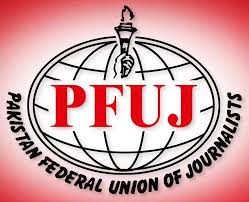PFUJ’s book on its 70-year fight for press freedom set for launch
ISLAMABAD—A book on Pakistan Federal Union of Journalists’ eventful odyssey spanning seven decades is due for launch soon.
“From Layoffs to Lashes: PFUJ’s 70-year Fight for Media Freedom,” marks the union’s 70th anniversary.
No other body can match what PFUJ has achieved since its inception in 1950. It took on three military rulers—Generals Ayub Khan, Ziaul Haq, and Pervez Musharraf—and lived to tell its tales of defiance, long after the dictators met their fate. It worked tirelessly for media freedom and expression throughout its long journey.
PFUJ President Shahzada Zulfiqar and Secretary-General Nasir Zaidi said the book documents several eye-opening events during PFUJ’s struggle for press freedom.
Comprising over 50 chapters, more than 20 of them in English, the book has more than 500 pages. It chronicles the sacrifices rendered by journalists for press freedom in the 1970s and brings on record the strong-arm tactics employed by the establishment to silence independent-minded journalists.
Senior journalist Mazhar Abbas has compiled and formulated the book under a PFUJ project. Nizamuddin Siddiqui edited the English chapters, and Waris Raza did the Urdu editing.
The book, printed by the Karachi Union of Journalists, has chapters on the torchbearers of PFUJ’s campaigns like M.A. Shakoor, Asrar Ahmed, Minhaj Barna, and Nisar Osmani. It also highlights the national union’s efforts for improving the working and economic conditions of journalists.
Notable among the PFUJ campaigns were 1970, 1978, and 2007, during which journalists called strikes, held rallies and demonstrations, and even courted arrest. As a result, they were incarcerated and even flogged on the orders of military courts.
On other occasions, many were sacked by the management of their organizations. In short, they suffered physical hardships and economic deprivation.
“PFUJ played a leading role in defending the freedom of expression, economic rights of workers, and civil liberties throughout the 70 years of its existence,” the PFUJ leaders said.
Source: PFUJ/JP

